Books by Terry Darlington, John Humphrys, Paul Theroux, Max Hardberger, Peter Kerr, Brenda Jagger, Charlotte Bingham, reviewed by Madhuri.

 Narrow Dog to Indian River
Narrow Dog to Indian River
by Terry Darlington
I enjoyed this book so much! I was laughing every night for the days it took to read it. I’d read the previous one, Narrow Dog to Carcassone, and I think this one is even better.
A British poet and retired business owner takes his wife and whippet hound and his 60-ft long, 6-and-half-feet wide narrow boat, built for British canals, to the east coast of the USA to travel the Intra-Coastal Waterway down to Florida and the Gulf of Mexico. There are scary sounds, estuaries, lakes and swamps to navigate, plus a myriad of creatures: alligators, mosquitoes, chiggers, etc; weather, and last but not least, the legions of overweight and over-hospitable locals who want to feed and water the couple and their dog and their cute boat endlessly. The dog does not like boat life, and there’s that to contend with too.
But the real thing is the writing – original, telegraphic, quite naked, and very, very funny. I thoroughly enjoy British takes on American life anyway, and since now I live in an area of Britain where there are plenty of canals and narrow boats, it was all very agreeable. The writer does slip in some bits of educational history, but in such a funny and frank way that he can be forgiven. The writing takes shortcuts constantly so you have to be on your toes. I’m full of admiration for the author.
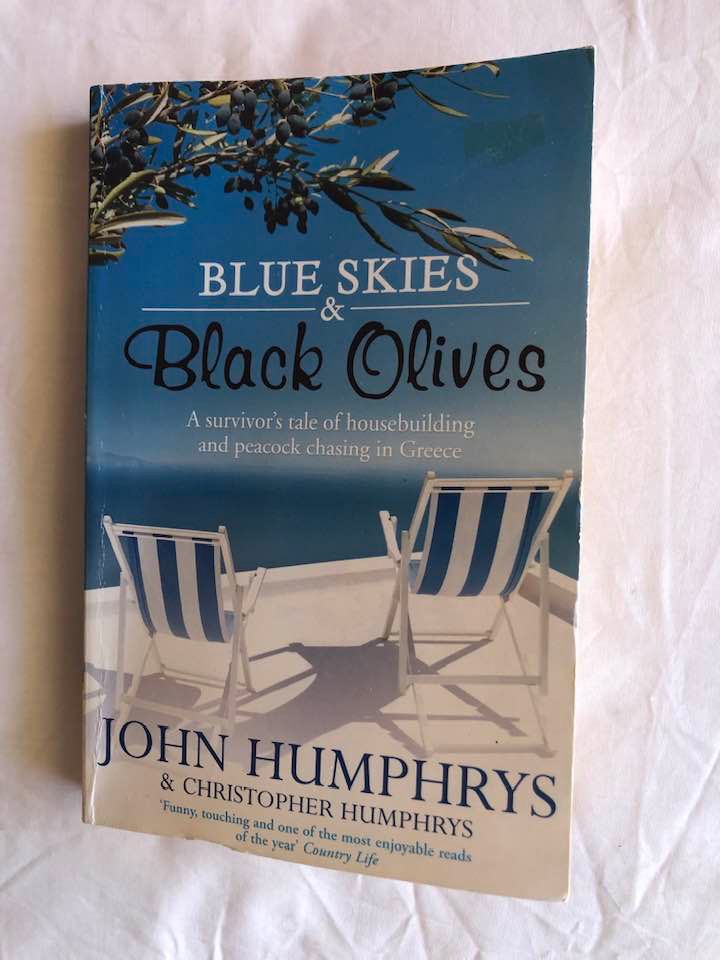 Blue Skies & Black Olives
Blue Skies & Black Olives
by John Humphrys
One of those Brits-buy-house-in-sunny-country-and-deal-with-quaint-locals books. This takes place in the Peloponnese, overlooking the Aegean. A well-known journalist and his cello-playing-married-to-an-Athenian son embark on renovating a cottage and building a big villa.
Lots and lots and lots of things go wrong of course. Bureaucracy, neighbours, the Greek relationship with time, unreliable builders, rats, etc etc. It’s quite funny and very instructive. You might want to read it if this is the sort of dream you have. There’s a nice interlude with a peacock as well.
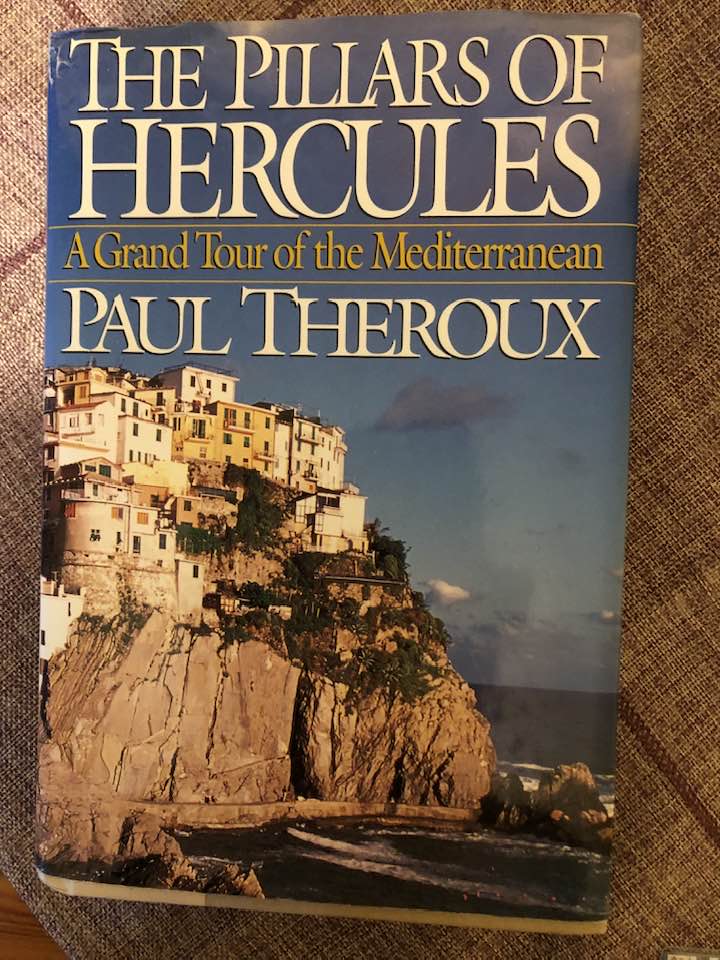 The Pillars of Hercules
The Pillars of Hercules
A Grand Tour of the Mediterranean
by Paul Theroux
A leisurely, thoughtful stroll – via boat, train, and bus – around the entire circumference of this anciently-and-constantly populated sea. He starts and ends at Gibraltar, and all along the way notes down everything that happens – everyone he meets, what they say, a bit – though not too much – about the history. He goes through war zones and pesky borders and tourist traps and wild desolate islands; travels on one luxury cruise ship, visits louche cities and brisk cities. He’s an erudite man, so there are many literary references, and he visits various writers, Turkish or British or American or Moroccan.
I liked this book very much. Although it was published in 1995 it still felt timely, and its 509 pages stretched out agreeably as we wended our way hither and yon. I learned a lot in a casual, overview way, and I also agreed with the author that what I liked best were the moments of observation and encounter – the daily things, the people and where they came from and what they said.
And the writing is beautiful, calm and poetic, with just enough personal glimpses cropping up throughout to make it feel real and fresh and grounded. I’d been to some of the places – others I have never seen nor ever want to see – and I got a further sense why I don’t want to see them!
An immense journey, done over 17 months with spontaneous timing, and he shares it all with us generously.
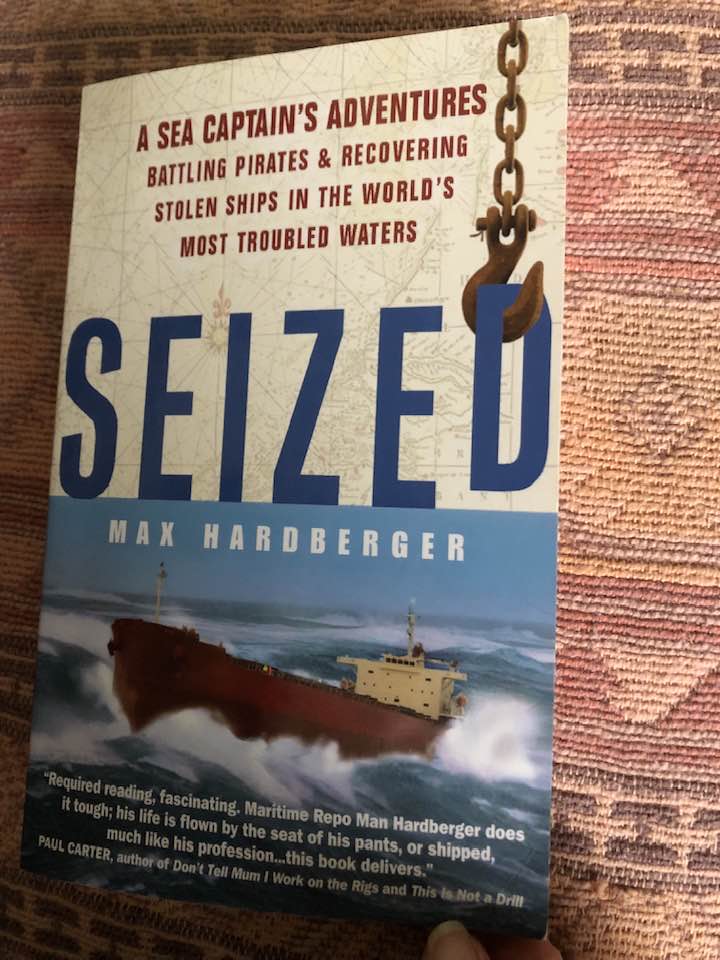 Seized
Seized
A Sea Captain’s Adventures
by Max Hardberger
I absolutely loved this book! It seems that shipping ports are rife with all sorts of skullduggery, even to the extent that entire ocean liners and freighters are stolen – often by the port authorities. In poor countries a ship will be seized for a trumped-up reason – say, the cargo it had just offloaded is claimed to be short – and later sold to benefit the port authorities. In rich countries draconian inspections find one thing amiss and pow, ship can’t sail. This benefits the port and the surrounding area as the ship spends lots of money there.
In poor countries sailors are often stranded when a ship is impounded and if their families can’t repatriate them they might starve. The owner often doesn’t help. In short, shit happens when it comes to ships.
So, enter the author, a captain, pilot, English teacher, maritime lawyer, ship surveyor, and intrepid adventurer. He is hired by the ship’s owner to rescue the ship; which means somehow managing to sail it out of port and off to another country. This requires the skills of an actor, captain, trouble-shooter, negotiator, diplomat, schmoozer, and leader of men; split-second timing, great intuition, and much more. The result is gripping! I’d never read anything remotely like it. The writing is excellent, the thrills and chills many, and we get a picture of an intensely masculine yet deep-feeling human being. (Was his wife happy about all this? NOoooooo… )
And we meet all sorts of characters, as you might imagine. Pirates, sneaky agents, helpful ones, police, judges, sailors, captains, fix-it guys, each one well-drawn as an individual.
If you’d ever wondered about places like Haiti and Dominican Republic and Belize and even Rotterdam… your curiosity will be satisfied without having to go there (unless you really want to. After reading this, I really don’t!) A unique book and highly recommended. The author has written two more which I intend to look for.
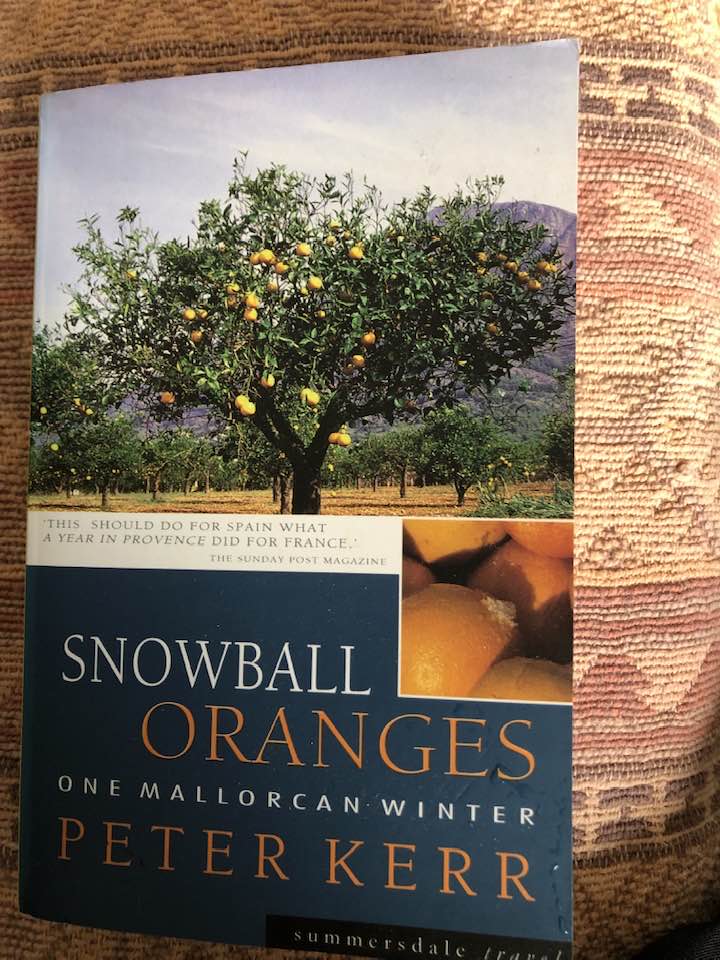 Snowball Oranges
Snowball Oranges
One Mallorcan Winter
by Peter Kerr
This also belongs to the genre of English-people-moving-to-hot-country-and-fixing-up-charming-old-villa-with-lots-of-problems-whilst-navigating-quaint-local-people-and-customs. Except that they moved from Scotland.
I have never been to Mallorca, I’m sorry to say – if you have, you might be more engaged with the book. As it was though it was funny without being hilarious, and had a nice down-home authentic feel to it. The author’s family try to make a go of citrus orchards, the former owners of the house live next door and manage to manipulate the new owners into feeding their herd of dogs and cats, there are colorful characters on every page – not least the glorious mountains looming over everything.
If you ever dreamed of moving to the island, the book would be particularly useful and informative.
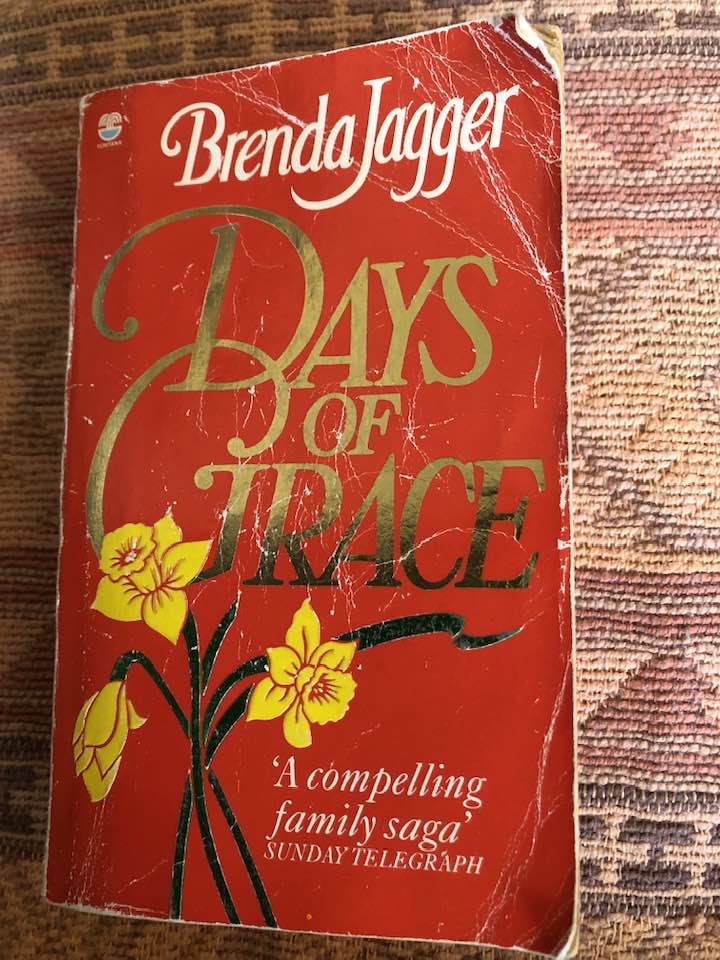 Days of Grace
Days of Grace
by Brenda Jagger
This beat-up, rather garish-looking book turned out to be a gem. The writing is confident and flawless, the story original and fascinating. A very-determined young Englishwoman, brought up in Paris by a flighty beauty of a mother and her various husbands, inherits a manor and land in West Yorkshire. It’s the end of the nineteenth century, and the times are convincingly depicted. She brings her mother and siblings home and proceeds to scheme and manipulate circumstances to, she hopes, everyone’s benefit. Then she falls in love with a cousin… The story, 476 pages of it, proceeds through minute descriptions of relationships and inner workings of the characters. It’s sophisticated and flowing, enriched by scenery and garb and food.
We move into the time of the Suffragettes and the almost-unbelievable abuses these elegant wealthy ladies were punished with. We are not spared, and when WW1 intervenes we are told exactly what that is going to lead to too. A woman’s view, fully empowered, fully wise – that is what this book offers; yet one of the most grounded and intelligent characters is a man – no, three of them are men. Interesting.
Anyway, I thoroughly enjoyed this book – loosely known as a family saga, but so juicy and various and full-blooded that it doesn’t fit into the category in any small or limited way.
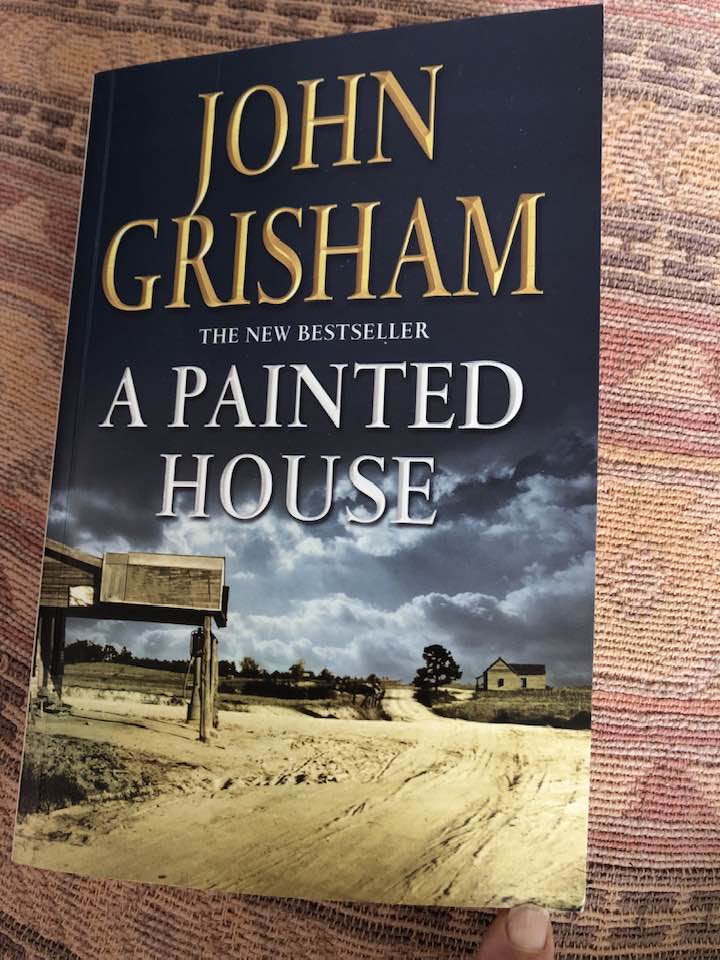 A Painted House
A Painted House
by John Grisham
In his own bald, steady way, Grisham tells a strangely-poetic story.
We are dropped right into rural Arkansas in 1952 (and it was quite a drop, as I’d just been inside the posh ballrooms of Victorian London in the book I’d been reading). A hardworking family tries to make a go of a cotton farm, whilst worrying about a soldier son/uncle/brother in Korea, the fickle weather, their desperately-poor neighbours… It’s harvest time, and the whole family works in the hot sun next to the teams of Mexicans and hill people they’ve hired. The story is narrated by a curious 7-year-old boy who eavesdrops and spies on everything going on around him, and can easily hide amongst the cotton to monitor what certain adults are doing.
So we seem to spend a lot of the book at ground level, among tall plants; we don’t go anywhere much except the tiny town of Black Oak (pop 300). And plenty goes on… bad guys, fights, church picnics, seductions, consequences. And then… Big Weather. We are pulled right into 3 generations of family life (the setting is based on Grisham’s own childhood farm) and the tensions between various factions. And a child seeing what it is too much for him to see.
There is rather a lot of baseball – mostly on the radio – always a danger with this author – though of all the sports I find it the least tedious! But the word ‘lawyer’ does not appear even once, nobody is clever or outwits anybody. It’s a down-home story with an open ending rather than a neat, contrived one. Like real life.
I enjoyed the frisson of horror: “I’m so glad I don’t live in rural Arkansas!” But I also loved visiting it, in Grisham’s safe hands – the clear, measured storytelling, the unexpected touches, the amazement at the way things reach their humid, calm crescendo, somehow both bleak and rich.
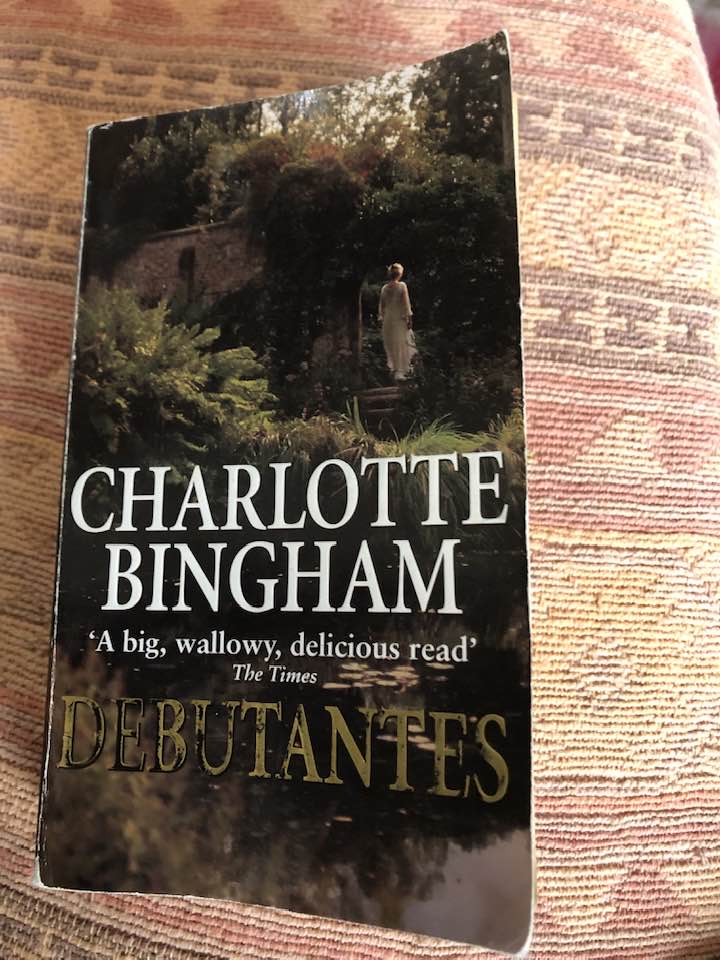 Debutantes
Debutantes
by Charlotte Bingham
I found this in the book-trading booth and didn’t expect much from it, judging by the cover. But! I was delightedly enthralled for the entire 704 pages, and didn’t want it to end!
Three very different teenage girls – one a sailing enthusiast, one from a carefully-cloaked background in Yorkshire, and one from the horsey wilds of Ireland – end up in London to make their debuts and, their families hope, marry rich men. The machinations behind all of this almost make our heads swim, but not quite, because the writing is utterly calm and self-assured, is in no hurry at all, and is full of wonderful, original touches. In particular the Irish scenes are marvellous with diction and poetry and mystery.
This is social observation with a pinch of extra fancy to buoy us up into a restful bath of long-ago-made-fresh. The characters are artfully and knowingly drawn – from the horrible, lisping, calculating grande dame Daisy Lanford to the saintly, luminous, hugely-intelligent Miss May Danby, straight from the convent to the Season – and we enjoy the rich array.
You know the old adage about revenge being a dish best enjoyed cold? That’s a theme here, but it’s social revenge, and the plot weaving it all together is leisurely and masterful.
If you like ballgowns, horses, sailing, or the comeuppance of snobs, plus excellent writing – this might be for you. I tend to avoid historical novels in case they have too much of the modern eye and speech in them, but I trusted this writer right away, and intend to order more of her books. She is, it seems, a prolific crafter of dramas for stage and screen.
These reviews were first posted on Facebook by the author
Featured image credit to Finde Zukunft on Unsplash
Related articles
- Madhuri’s collection of Short Reviews: Late Evening Reading





Comments are closed.